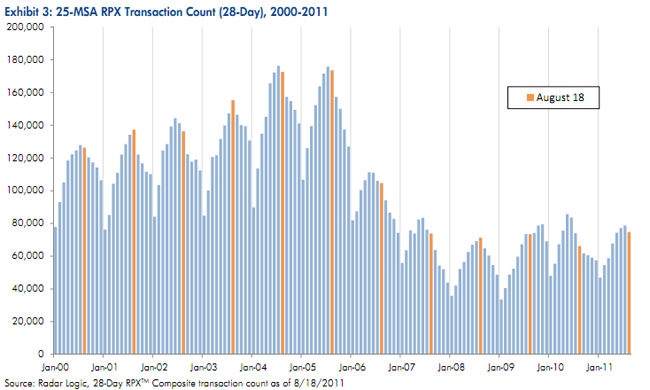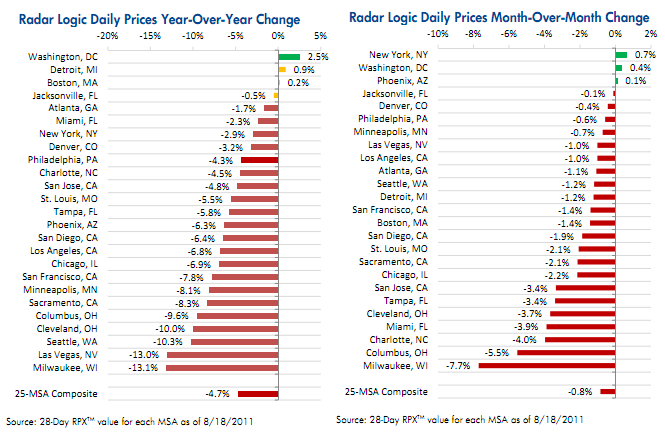The seasonal decline in home prices that always proceeds the holidays and continues through the cold winter months has already begun, appearing earlier and sharper than usual. Radar Logic reports that its RPX Composite Price which tracks housing prices in 25 metropolitan statistical areas (MSA) fell 0.8 percent between the data points of July 18 and August 18 and was 4.7 percent lower than on August 18, 2010. This was the largest decline in the Composite Price at this time of year since 2008 and the year-to-date gain in the RPX through August was the smallest in the Composite's history except for 2008, a notably terrible year for housing.
Month-over-month price changes were positive in only two metropolitan areas; Washington, DC saw an appreciation of 0.4 percent and New York City was up 0.7 percent. The biggest losers pricewise were Milwaukee (-7.7 percent) and Columbus, Ohio (-5.5 percent). On a year over basis only Washington was up (2.5 percent) while Milwaukee saw a 13.1 percent decline and Las Vegas a 13.0 percent loss. Three cities, Detroit, Boston, and Jacksonville, Florida were neutral as to price changes for the year.
Home sales have also come down more quickly than is usually the case in late summer. The 25-MSA RPX transaction count declined 5.2 percent from July to August. Looking back over the previous 10 years (with the exception of 2010 where the June 30 expiration of the housing tax credit made the remainder of the year anomalous,) the July to August change, whether positive or negative, has been around 2 percent. The transaction count increased 13 percent year-over-year through August, but this change had more to do with disruptions caused by the tax credits than strong sales during the year. RPX said that these year-to-year gains from the tax credit reaction in 2010 will disappear by the end of the year if home sales hold to their usual seasonal patterns.

St. Louis, Missouri had a spurt of nearly 40 percent in sales
during the month and an increase for the year-to-date of 46.7 percent. Other MSAs with positive changes in
transactions since July are Las Vegas, and Boston. Transactions dropped 19 percent between July
and August in Charlotte, North Carolina and 15.0 percent in Tampa. Charlotte is also in negative territory for
the year (-6.5 percent as is Detroit (-6.4 percent) and San Jose, California
(2.2 percent.) The remaining 22 MSAs
have seen increases in transactions year-over-year; Boston has the highest
positive change (48.4 percent) followed by St. Louis and Minneapolis (29.2
percent).
Radar Logic restated its contention from May that the change in conforming loan limits that were effective October 1 will not significantly impact the RPX Composite Price nor significantly affect most prices it tracks at the MSA level. The company said that a close look shows that rather than reducing the overall demand for homes and thereby reducing aggregate home prices, the new loan limits affect only a small percentage of sales because most housing markets were not considered high cost areas. Even in those markets that were designated high-cost, sales in the price band between the old elevated limits and the new ones make up only a small percentage of total sales. For example, in the three areas with the largest percentage of sales in the "reduction zone," New York, San Francisco, and San Jose, less than ten percent of sales will be affected by the change. "There may be a shift in the mix of sales out of the reduction zone toward lower price levels, but given the small percentage of sales affected, the impact of such a mix-shift on MSA-level RPX prices will probably be minimal."








